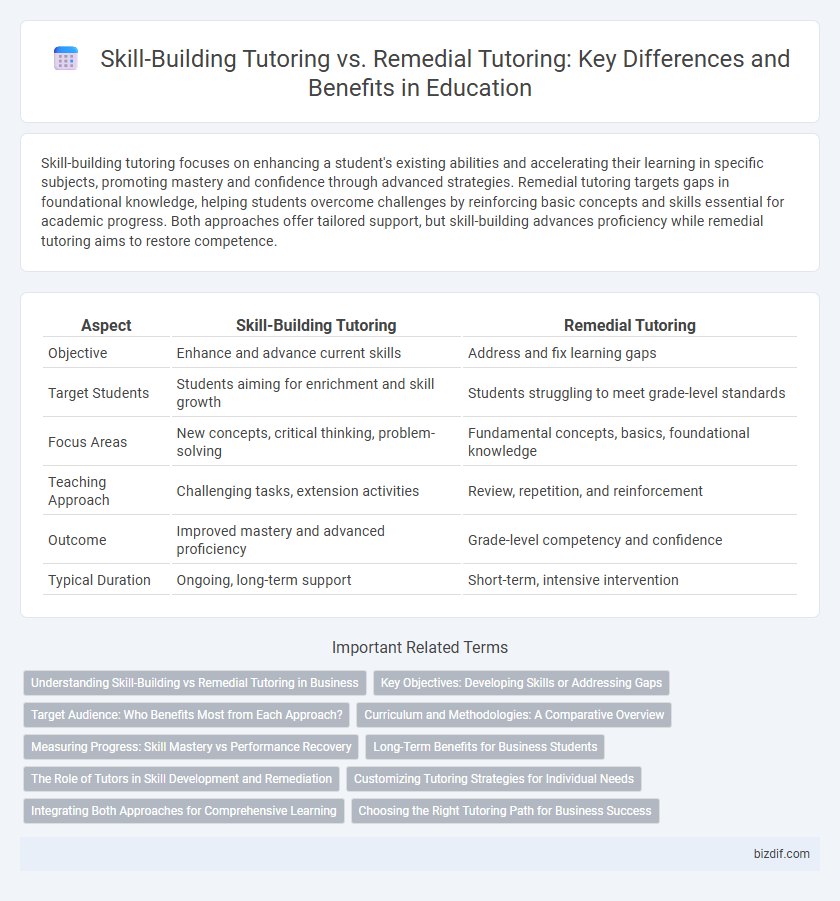Skill-building tutoring focuses on enhancing a student's existing abilities and accelerating their learning in specific subjects, promoting mastery and confidence through advanced strategies. Remedial tutoring targets gaps in foundational knowledge, helping students overcome challenges by reinforcing basic concepts and skills essential for academic progress. Both approaches offer tailored support, but skill-building advances proficiency while remedial tutoring aims to restore competence.
Table of Comparison
| Aspect | Skill-Building Tutoring | Remedial Tutoring |
|---|---|---|
| Objective | Enhance and advance current skills | Address and fix learning gaps |
| Target Students | Students aiming for enrichment and skill growth | Students struggling to meet grade-level standards |
| Focus Areas | New concepts, critical thinking, problem-solving | Fundamental concepts, basics, foundational knowledge |
| Teaching Approach | Challenging tasks, extension activities | Review, repetition, and reinforcement |
| Outcome | Improved mastery and advanced proficiency | Grade-level competency and confidence |
| Typical Duration | Ongoing, long-term support | Short-term, intensive intervention |
Understanding Skill-Building vs Remedial Tutoring in Business
Skill-building tutoring in business focuses on developing competencies like leadership, communication, and problem-solving to enhance overall performance and career growth. Remedial tutoring targets specific deficiencies, helping individuals address knowledge gaps and improve foundational skills critical for job success. Understanding the distinction enables organizations to tailor training programs that either build new abilities or repair existing weaknesses for optimal workforce development.
Key Objectives: Developing Skills or Addressing Gaps
Skill-building tutoring targets the enhancement of existing knowledge by fostering critical thinking, problem-solving abilities, and advanced comprehension in subjects, aiming for academic growth and intellectual development. Remedial tutoring focuses on identifying and addressing specific learning gaps or deficiencies to bring students up to grade-level proficiency and build foundational skills. Both approaches prioritize tailored instruction, but skill-building emphasizes enrichment while remedial tutoring concentrates on gap closure and skill recovery.
Target Audience: Who Benefits Most from Each Approach?
Skill-building tutoring primarily benefits students aiming to advance their knowledge and enhance proficiency in subjects like math, science, or language arts, often targeting high achievers or motivated learners seeking enrichment. Remedial tutoring best serves students struggling with foundational concepts, such as those facing learning gaps or difficulties in basic literacy or numeracy skills, providing targeted support to close academic deficiencies. Each approach is tailored to distinct learner profiles, ensuring personalized intervention for optimal educational outcomes.
Curriculum and Methodologies: A Comparative Overview
Skill-building tutoring emphasizes a proactive curriculum designed to advance student competencies through personalized, project-based learning and mastery-oriented assessments. Remedial tutoring focuses on targeted curriculum interventions that address specific learning gaps using repetitive practice, diagnostic assessments, and scaffolded instruction. Methodologies in skill-building prioritize critical thinking and application, while remedial approaches rely on reinforcement and skill recovery techniques to boost foundational knowledge.
Measuring Progress: Skill Mastery vs Performance Recovery
Skill-building tutoring emphasizes measuring progress through skill mastery by tracking consistent improvement in complex concepts and application abilities, often using formative assessments and mastery-based benchmarks. Remedial tutoring focuses on performance recovery by identifying specific gaps in knowledge and monitoring short-term gains in foundational skills to elevate students to grade-level proficiency. Both approaches utilize data-driven feedback, yet skill-building aims for long-term competency development while remedial tutoring targets immediate academic correction.
Long-Term Benefits for Business Students
Skill-building tutoring enhances critical thinking, problem-solving, and analytical skills essential for business students, fostering long-term academic success and career readiness. Remedial tutoring addresses immediate learning gaps but may not develop the advanced competencies required for strategic decision-making in business environments. Investing in skill-building tutoring results in sustained knowledge retention and improved adaptability in dynamic market conditions.
The Role of Tutors in Skill Development and Remediation
Tutors play a crucial role in both skill-building tutoring and remedial tutoring by tailoring instructional strategies to meet individual learner needs. In skill-building tutoring, the focus lies on enhancing existing competencies and fostering advanced cognitive abilities through targeted practice and enrichment activities. Remedial tutoring concentrates on addressing specific learning gaps by reinforcing foundational knowledge and employing diagnostic assessments to guide personalized interventions.
Customizing Tutoring Strategies for Individual Needs
Skill-building tutoring focuses on advancing a student's existing abilities by developing higher-level competencies through tailored exercises and challenges, while remedial tutoring addresses specific learning gaps by reinforcing foundational concepts missed or misunderstood. Customizing tutoring strategies involves assessing individual learning styles, strengths, and weaknesses to design targeted interventions that promote effective skill acquisition or recovery. Employing diagnostic assessments and adaptive teaching methods ensures personalized support that maximizes student progress and confidence.
Integrating Both Approaches for Comprehensive Learning
Skill-building tutoring enhances students' foundational knowledge and fosters critical thinking, while remedial tutoring addresses gaps and misunderstandings to ensure mastery of core concepts. Integrating both approaches creates a personalized learning experience that targets weaknesses and promotes ongoing skill development. This comprehensive strategy improves academic performance and builds long-term confidence in learners.
Choosing the Right Tutoring Path for Business Success
Skill-building tutoring enhances foundational knowledge and cultivates advanced competencies, empowering students to excel and innovate in competitive business environments. Remedial tutoring targets specific learning gaps, ensuring essential skills are solidified to prevent future academic struggles that can impede career growth. Selecting between skill-building and remedial tutoring depends on assessing the student's current proficiency and business goals to tailor effective educational interventions.
skill-building tutoring vs remedial tutoring Infographic

 bizdif.com
bizdif.com